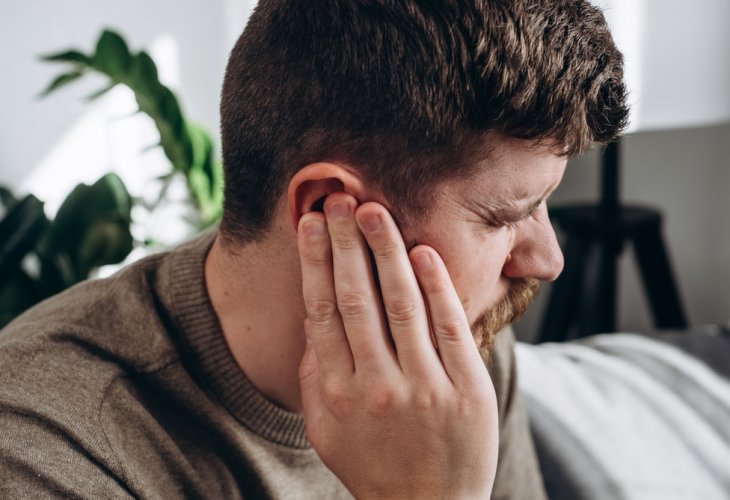Understanding Tinnitus: Causes, Symptoms, and Daily Coping Strategies
Tinnitus affects millions, often triggered by noise exposure, age, medical conditions, or medications. Explore its causes, symptoms, and effective daily coping methods in this comprehensive guide.
 (Photo: shutterstock)
(Photo: shutterstock)Tinnitus, commonly known as ringing in the ears, is a widespread phenomenon affecting millions of people globally. Various estimates suggest that about 10-15% of the population experiences some level of tinnitus, with around 1-2% suffering severe enough symptoms to impact their quality of life.
Tinnitus refers to sounds heard in the ears without an external sound source. These sounds can vary from person to person and include tones like whistling, buzzing, or persistent noise. This article delves into the causes of tinnitus, associated symptoms, treatment methods, and ways to manage this condition daily.
Symptoms
Tinnitus can manifest in different forms and may be accompanied by additional symptoms. Common symptoms include:
Types of Sounds
The sounds associated with tinnitus can vary between individuals. Common sounds include:
Whistling, buzzing, humming, persistent noise, murmuring, frequency, and volume of sounds.
The frequency and volume of these sounds can differ among individuals. Some people may hear these sounds continuously, while others experience them intermittently.
Impact on Hearing
In certain cases, tinnitus can affect a person's hearing quality. The noise may hinder the ability to hear regular sounds and sometimes make it difficult to understand speech.
Accompanying Symptoms
Tinnitus can occur alongside other symptoms such as headaches, dizziness, increased fatigue, and even depression and anxiety.
Causes
Several possible causes of tinnitus include:
Exposure to Loud Noise
Prolonged exposure to loud noise is one of the most common causes of tinnitus. Noise sources such as concerts, work in heavy industries, or even extended use of headphones at high volume can damage inner ear cells, leading to ear ringing.
Age
As we age, our hearing naturally declines. People over the age of 60 are at a higher risk of developing tinnitus due to the weakening of hearing cells and structures in the inner ear.
Medical Conditions
Various medical conditions can cause tinnitus, such as:
* High blood pressure: Increased blood flow in vessels near the inner ear may cause noise.
* Atherosclerosis: Hardening of blood vessels can lead to irregular blood flow and tinnitus.
* Ear infections and inflammations: Inflammation in the middle or inner ear can cause temporary tinnitus.
* Changes in the auditory system: Surgical or injury-related changes can result in tinnitus.
Medications
Use of certain medications may cause tinnitus as a side effect. Antibiotics, antidepressants, and even large amounts of aspirin can lead to ear ringing.
Stress and Anxiety
Emotional stress and anxiety can affect the nervous system and cause tinnitus. Often, tinnitus appears due to unstable emotional states or extreme stress.
Other Causes
Other factors potentially contributing to tinnitus include:
Head or neck injuries: Such injuries can damage the auditory system and cause ear ringing.
Dental and jaw issues: Problems in jaw muscles or joints may lead to tinnitus.
Treatment Methods
There are several ways to treat tinnitus, including:
Medical Treatment
Many cases of tinnitus result from a medical condition that requires treatment. A doctor can conduct various tests like hearing tests, blood tests, and imaging scans to diagnose the cause of tinnitus and recommend appropriate treatment. Medical treatments may include:
* Medications: Certain medicines can alleviate tinnitus symptoms.
* Surgery: In rare cases, surgery may resolve tinnitus caused by a physiological issue.
Complementary Treatments
Complementary treatments can help ease tinnitus symptoms. These include:
* Sound therapy: Calming sounds like soft music or white noise can reduce the sensation of tinnitus.
* Laser therapy: Low-level laser treatment can improve blood flow and alleviate symptoms.
* Biofeedback therapy: Focusing on controlling mental tension and anxiety, this therapy may reduce tinnitus symptoms.
Psychological Treatments
Psychological treatment can be crucial for addressing tinnitus, especially when accompanied by anxiety or depression. Psychological therapies include:
* Cognitive-behavioral therapy (CBT): This therapy focuses on changing thinking and behavior patterns that may exacerbate tinnitus.
* Mindfulness: Practicing mindfulness can help reduce stress and anxiety, aiding in better management of tinnitus.
Natural Treatments
Various natural treatments can help alleviate tinnitus symptoms, including:
* Essential oils: Oils such as lavender or chamomile can help relax and reduce tinnitus sensations.
* Proper nutrition: A balanced diet rich in vitamins and minerals can enhance overall health and reduce symptoms.
* Physical activity: Regular exercise can improve blood flow and lessen tinnitus sensations.
Daily Coping Strategies
Coping with tinnitus daily can be challenging, but several steps can help:
* Create a calming environment - Using calming sounds like soft music or white noise can help reduce tinnitus feelings. Creating a soothing home and work environment can foster better symptom management.
* Manage stress - Mental stress and anxiety can exacerbate tinnitus symptoms. Practicing stress management techniques like yoga, meditation, and mindfulness can help reduce symptoms and improve quality of life.
* Maintain a healthy routine - A healthy routine including proper nutrition, regular exercise, and sufficient sleep can enhance overall health and lessen tinnitus sensations.
* Seek expert consultation - If tinnitus significantly impacts quality of life, consulting specialists for advice and appropriate treatment is essential. Consulting an ENT doctor, psychologist, or complementary therapy expert can help find an effective solution and better manage the condition.
In conclusion, tinnitus is a common condition that can significantly affect quality of life. Understanding the causes of tinnitus, identifying symptoms, and knowing the various treatment options can aid in better managing the condition. It's vital to remember that everyone experiences tinnitus differently, so finding the right treatment for each individual is crucial. By creating a calming environment, managing stress, and maintaining a healthy routine, individuals can better cope with tinnitus.

